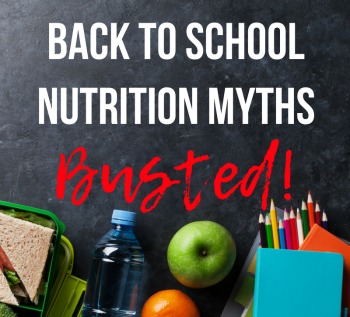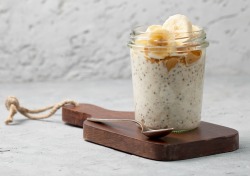 |
|
|
|
When it comes time to set the foundation for a successful school year, many parents want to make good nutrition a top priority. However, between food marketing campaigns, facebook post and simple miscommunication or misunderstanding, there is still a lot of information that leaves parents feeling overwhelmed and confused on what to feed their children.
The truth is that much of what we believe about food is just hearsay, information that has been passed along and marketed to us over years. In this issue, I am busting a few common nutrition myths and misconceptions, specifically myths I hear from parents regarding their own beliefs and how they feed their children.
What nutrition myth do you need busted? Send it my way!
- Stephanie
|
|
|
Back to School Nutrition Myths - Busted!
|
|

Myth #1: Food labeled “natural” means they are a healthier choice
Truth: According to the USDA, food labeled “natural” means the ingredients are minimally processed and contain no artificial ingredients or preservatives. However, that is the extent as to what it means. Natural foods may still contain they may contain antibiotics, growth hormones, processed sugar, and other chemicals. A food labeled “natural” may still be high in calories, fat, sodium or sugar, therefore it is important to read the nutrition label and ingredient list before making your purchase.
Myth #2: Orange juice is essential for vitamin C
Truth: A 4 ounce glass of orange juice does provide 62 mg of vitamin C, but there are other food sources that provide the same or more vitamin C along with a variety of vitamins, minerals and antioxidants. Boost your families vitamin C intake with foods such as: kiwi, oranges, papaya, Brussel sprouts, strawberries, broccoli and red bell peppers.
Myth #3: Oatmeal is a good start the day
Truth: Okay, let me be clear, traditional oatmeal IS a healthy start to the day. But instant oatmeal like Maple and Brown Sugar, Strawberries and Cream and Dinosaur Egg are packed with added sugar, preservatives and flavors, turning a good-for-you food into a sugar-coated breakfast bowl. When you hear nutrition experts talk about oatmeal as a healthy breakfast option, they are usually referring to plain oatmeal sweetened with fresh fruit, spices, and nuts. If you love serving oatmeal for breakfast, check out this month’s recipe for overnight oats!
Myth #4: Nutrition bars provide good nutrition
Truth: We have been sold on the hype that nutrition / energy / protein bars are actually a good source of nutrition. While there are some good brands that have been minimally processed and are not loaded with extra fat and sugar, most grab-and-go nutrition bars are loaded with not- so-good ingredients. Not only are they calorie-dense (a typical bar will run about 180 - 220 calories) but they are also filled with added sugar, chemicals and preservatives. Many of these “nutrition” bars will still leave you hungry and unsatisfied after eating them. My advice: eat real food. A half of a turkey sandwich on whole grain bread with avocado, lettuce and tomatoes will pack in the same amount of calories and protein but less sugar and fat.
|
|
|
|
|
Featured Recipe
Peanut Butter Banana Overnight Oats |
|
|
Recipe by: Quaker Oats
Ingredients:
- 1/2 cup Quaker® Oats
- 1/2 cup low-fat milk
- 1 teaspoon chia seeds
- 1/4 teaspoon vanilla extract
- 1/2 teaspoon cinnamon
- 1/4 cup bananas, sliced
- 1 tablespoon creamy peanut butter
- 1 teaspoon honey
Directions: Add Quaker® Oats to a container of your choice and pour in milk. Mix in vanilla extract, chia seeds, and cinnamon. Alternate between layers of peanut butter and layers of sliced banana. Drizzle with honey. Place in fridge and enjoy in the morning or a few hours later!
Makes 1 serving.
Nutrition Facts: 390 calories, 13 gm fat, 2.5 gm sat fat, 60 mg sodium, 57 gm carbs, 9 gm fiber, 14 gm fiber
| |
| |
|
|
“Don’t eat anything your great-great grandfather wouldn’t recognize as food. There are a great many food-like items in the supermarket your ancestors wouldn’t recognize as food (Go-Gurt? Breakfast-cereal bars? Non-dairy creamer? Stay away from these.” – Michael Pollan
|
|
|
|
| Nutrition Tips Worth Following All Year Long: |
|
|

- Eat breakfast. A balanced breakfast is an important start to the day, especially for young, developing minds. A balanced breakfast will include 100% whole grains, lean protein, plant-based fats, fruits and vegetables.
- Close the kitchen. It is okay to close the kitchen and set boundaries around eating. Children don’t need access to food all day long and setting times that the kitchen is closed helps to mindless snacking. If your child wants to eat outside of assigned meal or snack times, reassure him or her when the next meal time is scheduled.
- Eat more plants. Teach kids the importance of eating more plant based foods. When talking about plant based foods be sure to include fruits, vegetables, whole grains, nuts, seeds, beans and legumes.
- Reduce animal fat consumption. By eating more plants we can encourage children to eat less animal products. Get your family involved and challenge them to find recipes for a weekly meatless meal.
- Ditch drinks with sugar. Sugary drinks such as soda are loaded with calories and sugar while providing no nutritional benefits. Encourage kids to drink more water and have fun exploring how to make your own fruit flavored waters.
|
|
|
|
|
| ABOUT SO Nutrition |  | Stephanie Leipprandt Ouellette, MBA, RDN, LD Stephanie has been working in the field of nutrition and dietetics since 1995. She earned a Bachelor of Science degree in Dietetics from Michigan State University, completed an Approved Pre-Professional Practice Program at Western Michigan University and earned a Master of Business Administration from Baker College. She’s been a Registered Dietitian Nutritionist since 1996 and licensed in Texas since 2007. In 2008, Stephanie earned her certification in Childhood and Adolescent Weight Management. Stephanie has extensive clinical & managerial experience, both in corporate settings and in the community. Now she wants to share her knowledge with you, because most (if not all) nutritional habits begin at home.
Stephanie and her family reside in Katy, Texas
|
|
| Copyright © 2018 Customized Nutrition Newsletters, All rights reserved. |
|
|